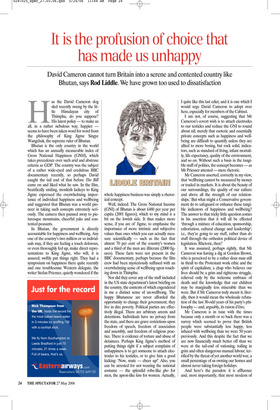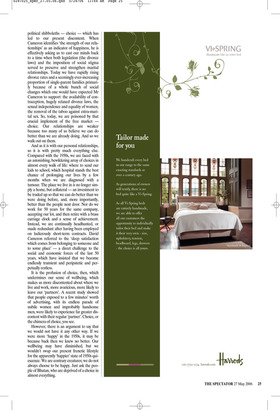It is the profusion of choice that has made us unhappy
David Cameron cannot turn Britain into a serene and contented country like Bhutan, says Rod Liddle. We have grown too used to dissatisfaction Has the David Cameron dog sled recently swung by the little Himalayan city of Thimphu, do you suppose? His latest policy — to make us all, in a rather nebulous way, happier seems to have been taken word for word from the philosophy of King Jigme Singye Wangchuk, the supreme ruler of Bhutan.
Bhutan is the only country in the world which has an annually measurable index of Gross National Happiness (GNH), which takes precedence over such arid and abstruse criteria as GDP. The country was the subject of a rather wide-eyed and credulous BBC documentary recently, so perhaps David caught the tail end of that before The Bill came on and liked what he saw. In the film, beatifically smiling, monkish lackeys to King Jigme expressed the overwhelming importance of individual happiness and wellbeing and suggested that Bhutan was a world pioneer in taking such concepts extremely seriously. The camera then panned away to picturesque mountains, cheerful yaks and contented peasants.
In Bhutan, the government is directly accountable for happiness and wellbeing. Any one of the country’s two million or so individuals may, if they are feeling a touch dolorous, or even thoroughly fed up, make direct representations to King Jigme, who will, it is assured, swiftly put things right. They had a symposium on happiness there quite recently and one troublesome Western delegate, the writer Stefan Priesner, quietly wondered if the whole happiness business was simply a rhetorical concept.
Well, indeed. The Gross National Income (GNI) of Bhutan is about £480 per year per capita (2001 figures), which to my mind is a bit on the lowish side. It thus makes more sense, if you are ol’ Jigme, to emphasise the importance of more intrinsic and subjective values than ones which you can actually measure scientifically — such as the fact that almost 70 per cent of the country’s women and a third of the men are illiterate (2000 figures). These facts were not present in the BBC documentary, perhaps because the film crew had been mysteriously suffused with an overwhelming sense of wellbeing upon touching down in Thimphu.
Nor did they cover any of the stuff included in the US state department’s latest briefing on the country, the contents of which engendered in me a distinct sense of un-wellbeing. The happy Bhutanese are never afforded the opportunity to change their government; they live in dire poverty. Political parties are effectively illegal. There are arbitrary arrests and detentions. Individuals have no privacy from the state, and there are grave restrictions upon freedom of speech, freedom of association and assembly, and freedom of religious practice. There is evidence of torture and abuse of detainees. Perhaps King Jigme’s method of putting things right if a subject complains of unhappiness is to get someone to attach electrodes to his testicles, or to give him a good kicking: ‘Now, mate — cheer up!’ Also, you can be arrested for not wearing the national costume — the splendid robe-like gho for men, the apron-like kira for women. Actually, I quite like this last edict, and it is one which I would urge David Cameron to adopt over here, especially for members of the Cabinet.
I am not, of course, suggesting that Mr Cameron’s covert wish is to attach electrodes to our testicles and reduce the GNI to round about nil; merely that esoteric and essentially private concepts such as happiness and wellbeing are difficult to quantify unless they are allied to more boring, but rock solid, indicators, such as standard of living, infant mortality, life expectancy, quality of the environment, and so on. Without such a basis in the tangible stuff of politics, the concept becomes — as Mr Priesner attested — mere rhetoric.
Mr Cameron asserted, correctly in my view, that ‘wellbeing cannot be measured by money or traded in markets. It is about the beauty of our surroundings, the quality of our culture and above all the strength of our relationships.’ But what might a Conservative government do to safeguard or enhance these tangible indicators of happiness and wellbeing? The answer to that tricky little question comes in his assertion that it will all be effected ‘through a mixture of education, sponsorship, exhortation, cultural change and leadership’; i.e., they’re going to say stuff, rather than do stuff through the orthodox political device of legislation. Rhetoric, then?
It was assumed, perhaps rightly, that Mr Cameron was having a dig at Gordon Brown, who is perceived to be a rather dour man still in thrall to the Protestant work ethic and the spirit of capitalism; a chap who believes our lives should be a grim and righteous struggle, relieved only by the welcome embrace of death and the knowledge that our children may be marginally less miserable than we were. But if Mr Cameron truly meant it, literally, then it would mean the wholesale refutation of the last 30-odd years of his party’s philosophy — and, arguably, its raison d’être.
Mr Cameron is in tune with the times because only a month or so back there was a survey which seemed to prove that British people were substantially less happy, less infused with wellbeing than we were 50 years previously. And this despite the fact that we are now financially much better off than we were at the tail-end of rationing, toiling in grim and often dangerous manual labour, terrified by the threat of yet another world war, a small percentage of us owning our homes and almost never taking foreign holidays.
And here’s the paradox: it is affluence and, most importantly, that most modern of political shibboleths — choice — which has led to our present discontent. When Cameron identifies ‘the strength of our relationships’ as an indicator of happiness, he is effectively asking us to cast our minds back to a time when both legislation (the divorce laws) and the imposition of social stigma served to preserve and strengthen marital relationships. Today we have rapidly rising divorce rates and a seemingly ever-increasing proportion of single-parent families primarily because of a whole bunch of social changes which one would have expected Mr Cameron to support: the availability of contraception, hugely relaxed divorce laws, the sexual independence and equality of women, the removal of the taboo against extra-marital sex. So, today, we are poisoned by that crucial implement of the free market choice. Our relationships are weaker because too many of us believe we can do better than we are already doing. And so we walk out on them.
And as it is with our personal relationships, so it is with pretty much everything else. Compared with the 1950s, we are faced with an astonishing, bewildering array of choices in almost every walk of life: where to send our kids to school, which hospital stands the best chance of prolonging our lives by a few months when we are diagnosed with a tumour. The place we live in is no longer simply a home, but collateral — an investment to be traded up so that we can do better than we were doing before, and, more importantly, better than the people next door. Nor do we work for 50 years for the same company, accepting our lot, and then retire with a brass carriage clock and a sense of achievement. Instead, we are continually headhunted, or made redundant after having been employed on ludicrously short-term contracts. David Cameron referred to the ‘deep satisfaction which comes from belonging to someone and to some place’ — a direct challenge to the social and economic forces of the last 50 years, which have insisted that we become endlessly transient and peripatetic and perpetually restless.
It is the profusion of choice, then, which undermines our sense of wellbeing, which makes us more discontented about where we live and work, more avaricious, more likely to leave our ‘partners’. A recent study showed that people exposed to a few minutes’ worth of advertising, with its endless parade of nubile women and improbably handsome men, were likely to experience far greater discontent with their regular ‘partner’. Choice, or the chimera of choice, you see.
However, there is an argument to say that we would not have it any other way. If we were more ‘happy’ in the 1950s, it may be because back then we knew no better. Our wellbeing may have diminished, but we wouldn’t swap our present frenetic lifestyle for the apparently ‘happier’ state of 1950s quiescence. We are contrary creatures; we do not always choose to be happy. Just ask the people of Bhutan, who are deprived of a choice in almost everything.











































































































 Previous page
Previous page